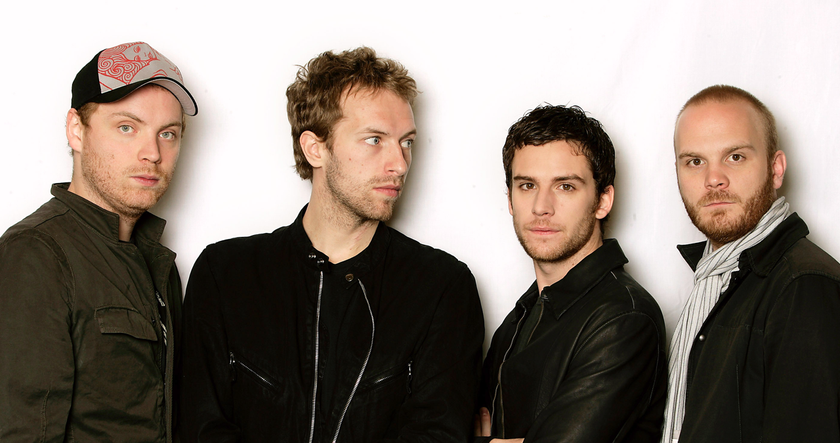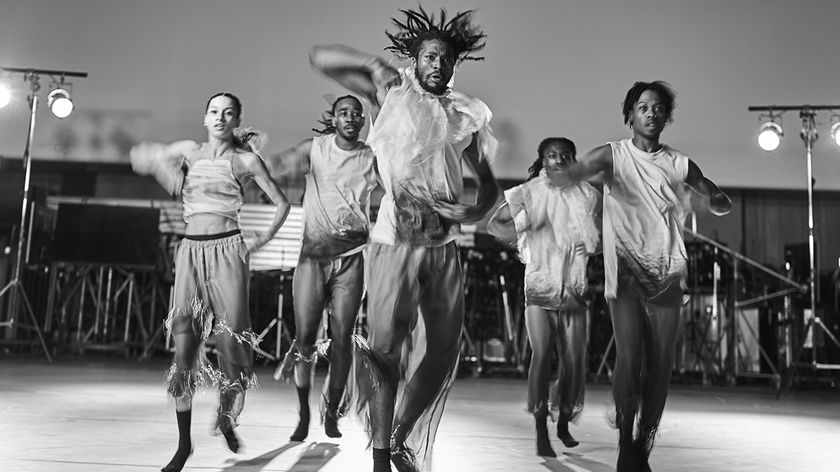Orange Goblin's Joe Hoare: "I feel bad for my guitar because I haven’t really looked after it that well and it’s still loyal"
The guitarist talks playing thousands of gigs with one SG, honing his tone and The Wolf Bites Back
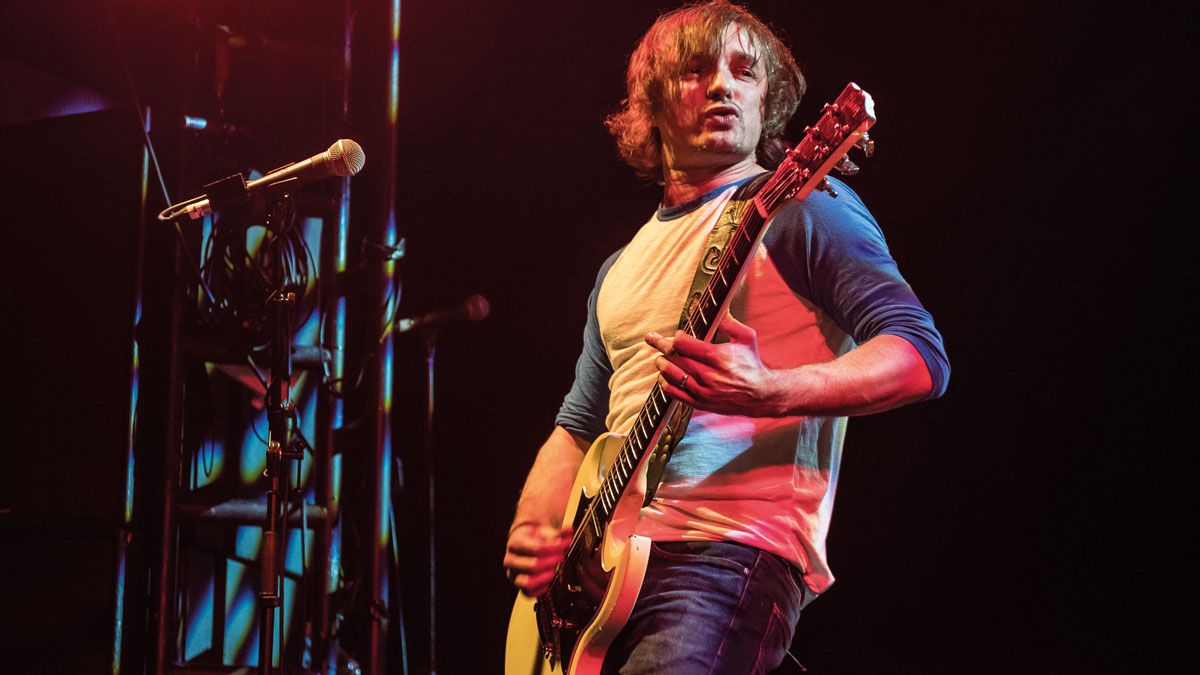
Where Orange Goblin place themselves on the rock-metal spectrum is entirely contingent on where they are at any given moment.
As guitarist Joe Hoare explains, ahead of the release of the London-based quartet’s ninth album, The Wolf Bites Back, there is no master plan. There are no rules.
Who needs rules to guide a freewheeling classic rock sound that orientates itself between the loose-leaf doom vibe of Black Sabbath and the punk energy of Motörhead, with inspiration from the likes of Pentagram, Pink Floyd, Free, Cream, Trouble and more filling in the gaps? No, Orange Goblin go with the riff takes them.
Comprising Hoare on guitars, with Martyn Millard on bass, Chris Turner on drums, and Ben Ward on vocals, Orange Goblin have been chasing the riff since the mid-1990s, and while that pursuit has damn near ground them into the bitumen, their first album in four years, The Wolf Bites Back finds their appetite undiminished.
There’s a feeling that Orange Goblin – perhaps because their image as lifers makes it impossible to envisage them gone – are taken for granted. But there’s no question Hoare goes unappreciated as a guitarist.
Hoare’s style is rooted in the blues. He’ll take a metal riff, groove with it, and then let it follow its own serpentine logic before it resolves itself. It lends Orange Goblin an improvisational feel, loosening up their sound.
Here, as he discusses the new album, his place in the band, philosophy to playing and gear, Hoare reveals himself as a guitarist of simple pleasures: he’s all about playing. The rest is just noise.
Get the MusicRadar Newsletter
Want all the hottest music and gear news, reviews, deals, features and more, direct to your inbox? Sign up here.
This album has been a long time in coming but stylistically it sounds so free, which is very Orange Goblin. Did you feel under any pressure when writing it?
We’ve never written a song and thought, ‘That sounds pretty good but it’s not us.’ We’ve just thought 'that it doesn’t sound very us' and then put it in anyway
“It is really what the band is all about: being free. And I think I probably told you before, it’s not about having any rules. We’ve never written a song and thought, ‘That sounds pretty good but it’s not us.’ We’ve just thought 'that it doesn’t sound very us' and then put it in anyway.
“The whole point is we just enjoy what we’re doing and I guess the only pressure we had was that we leave things to the last minute, and then go, ‘Shit, we’ve got to do an album. Let’s sort it out.’"
Had you been writing for a while before the deadline panic set in?
"A lot of the ideas, the songs on this album, I’ve had floating around for a long, long time. We’ll just sort of pick stuff out. It’s always a little bit slow to get started when you’re writing your album.
“I don’t know about other bands, but there are always those first few rehearsals where you’re sitting there going, ‘Err, what about this?’ And you’re almost a bit shy to show them a riff that you wrote in case they don’t like it, and you’re really proud of it. So you’re like, ‘I wrote this riff. What do you think?’
“It takes a while for the wheels to start moving, but, once you’ve got over that initial stage the songs just flow out and it becomes really fun. That’s when the magic starts happening.”
It's surprising to hear that you get shy in front of those guys after all these years and how close you are...
The band can be completely brutal at times. ‘Listen to this, guys, this is the best riff that I’ve ever written – probably anyone has ever written.’ You’ll play it, and they don’t so much tell you that it’s rubbish but you’ll just get that look
“Oh yeah, because they can be completely brutal at times. ‘Listen to this, guys, this is the best riff that I’ve ever written – probably anyone has ever written.’ You’ll play it, and they don’t so much tell you that it’s rubbish but you’ll just get that look. Or they’ll change the subject pretty quickly.
“But, remember, Chris also writes a lot of the riffs. Martyn writes a lot of the stuff as well, so it’s a collective... We’re all in the same boat. We’re all pretty honest with each other and that’s fine. That’s for the best. But, yeah, I still feel the pressure.”
How important is jamming to your process? Ghosts Of The Primitive feels like it could be extended into an epic jam.
“Yeah, again, when we start writing songs like that, those jams do go on for ages, and we can’t do that for 12 minutes on the album so we have to narrow it down. I’ve always loved the idea of doing a live show and just jamming it out, but, then again, I am the guitar player, so why wouldn’t I want to do that? But everyone else would just be bored and hate my guts if we did that live. But we certainly get that feel over of a band who are just having a lot of fun, jamming, just enjoying the music. I’m glad that’s come across.”
Maybe one night you’ll get the Orange Goblin super-jam on the go, maybe if Ben’s got a sore throat you could get away with it. Pretend it’s 1974.
“You’re putting ideas in my head now. How can I get Ben a sore throat? Yeah! I’d love to. That would be something I’d love to do but the guys are always like, ‘Joe, Joe, you can’t do that any more. Just stop.’ One day I’m going to get my blues band together and we’ll do that.”
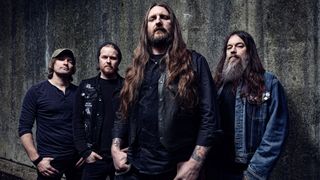
Ben says this is a darker album but it plays like a good-time, Saturday night record.
“I think so, too. I never understand it when Ben says it is a darker album but maybe he’s speaking more of lyrics and where he was coming from. Not necessarily in his head, ‘cos he’s not that miserable; though he is a bit miserable sometimes, he’s mainly a happy, loveable guy.
“I think he wanted to hit more of the dark side lyrically ‘cos, yeah, musically I think it’s quite fun. Especially Ghosts Of The Primitive, like you mentioned, it’s got more of a swanky, ‘70s ZZ Top feel.”
It always seems that Martyn handles the bass frequencies and you are in the midrange. Do you tune down?
“We tune down to D. Everything’s at D, a step down, and that’s how we’ve always had it. Apart from on Swords Of Fire, where we tune down to G, just for that one song, and just the lower E string is tuned down to G so we have an open tuning on that one. But everything else is standard D.
I get a lot of guys saying, ‘Oh you should have a heavier guitar sound because you’re supposed to be a stoner-rock band. Why aren’t you using like 15 amps and 19 Orange cabs and speakers?’
“Talking about Martyn’s bass a little bit, you’re right: the brunt of the heaviness is from Martyn’s bass. And I get a lot of guys saying, ‘Oh you should have a heavier guitar sound because you’re supposed to be a stoner-rock band. Why aren’t you using like 15 amps and 19 Orange cabs and speakers?’ But, really, like you said earlier, I think we’re more of a rock band. Obviously, we want to be heavy, but with the songs we play, if my guitar tone was too muddy, like it probably used to be back in the day, we realised that Martyn can handle that and it’s maybe a little more trebly on my side but the contrast works, especially live. I’ve let Martyn take over with the big elephant bass sound. We just want a classic rock tone.”
You’ve got a really amazing producer in Jaime Gomez Arellano. What does he add to the recording?
“Oh, Jaime is fantastic. He’s like a magician, this guy. He comes up with these ideas, like, 'We’re going to put a mic in the kitchen to get like a good snare drum sound.' Why are you putting it there? And then it will all make sense. He does things that, at the time, you’re thinking, ‘What’s he doing? I don’t understand what he’s messing about with, why he’s connecting this to this... ‘ But yeah, he is magic, and he works so hard as well. He did a lot of overtime on our album and he just wants it to sound the best, and I think he did a fantastic job.”
What did you use on the record?
“We used a load of different things. Again, Jaime would come in with all these different amps. I don’t know if you’ve seen the pictures of his studio – Orgone Studios, in Woburn – but he’s got this collection of amps lined up against the wall, and he was going in and out saying, ‘Let’s try this!’
“Well, first of all he asked me what sound I wanted. I said that I’ve got my Marshall JVM, and I love the sound of an [Marshall JCM] 800, so we connected both of them together. And then he said, ‘Well let’s try it with a Laney.’
“It was almost dizzying, the amount of things he was plugging in and taking out, trying different pedals. But I think, in the end, the majority of that sound was my JVM, the 800, and twiddling around with the settings, with a couple of pedals here and there. It was really just Marshall. That’s what I go for these days.”
And for guitars, it's always the white SG, right?
I’m stuck in my ways. We did a count and it must have been thousands of gigs, and the same guitar for all of those gigs
“It’s a Special. I’ve had it since ’94, so yeah, it’s really well used. It’s pretty much the only guitar I’ve used. It’s had the headstock broken a couple of times, and apart from the pickups, nothing’s changed on it at all. It’s just as it was. It just looks a lot more beaten up, a lot more... used.”
How many gigs has it played?
“Every gig since ’94. There’s been a couple of times when strings have broken and things have gone wrong that I’ve had to swap it over. I’ve got another brown SG, which is my backup. Once it got lost in an airport in Spain, and I had to borrow someone’s Gibson Flying V, which kind of felt all right.
“It was a bit weird using a different guitar. Like I say, I’m stuck in my ways. We did a count and it must have been thousands of gigs, and the same guitar for all of those gigs. I feel bad for my guitar because I haven’t really looked after it that well and it’s still loyal. ‘Yeah, okay, I’ll play another gig with you.’ I’m just hoping it lasts another 20 years.”
The pickups aren’t stock, though?
“Well they’re Lace pickups, they’re Nitro Hemis that I’m using. They are exactly what I wanted, really, a little bit brighter with a real lovely crunch to them. That’s what I’ve been using for the last three or four years, and I really love them.”
Do you remember your first guitar? And do you remember your first decent guitar?
“My first ever electric guitar was a Kay, which, funnily enough, was an SG copy. But it looked like my nan had made it. The pickups just looked like door-knockers and it the body was horribly thin, it went out of tune all the time. You just had to look at it and it would go out of tune. But I loved it! I learned a lot of stuff on that guitar.
“The guitar I remember loving, and again it wasn’t a great guitar, was my Squier, when I was about 13... A Stratocaster. That was like, ‘Wow! I’ve got a Strat!’ Even though it was only a Squier I was absolutely over the moon with that guitar. That was one I’d wake up in the morning and be really excited that I actually had this guitar.
“But, again, going back to the white SG, I didn’t buy any guitars until I got that one. It’s a bit sad, really, that’s the best guitar I ever had… But I’ve an Epiphone Les Paul that I’ve had for many, many years and I still think that’s a great guitar.”
Well, you won’t hear anything against Squier and Epiphone here.
“Yeah, well, on In Bocca Al Luppa, that’s the guitar I used on that song. I just remembered I brought that in.”
In Bocca Al Luppa is a very ‘70s, Laguna Sunrise-type of track.
“Well, we had finished the album and were sitting there, playing it to someone, and I suddenly realised that the album was really short! So we needed another track to put it up to the 40 minutes. But we were finished. The drums were packed away. It was just like we needed a new song, we needed very quickly, and so that night I went home and wrote that.
“I always like things like that, where I can just show off a little bit. I went in the next week and recorded it in a couple of hours. But it was just one of those things off the top of my head; it just flowed out, which doesn’t always happen, and luckily the guys liked it. It’s completely different to everything else on the album. I’m really proud of that one – it was kind of a happy accident.”
Was it placed halfway through to open the second half of the record?
“That was the idea. We wanted to open it with something different. We certainly wanted to close side one with Ghosts Of The Primitive, ‘cos it’s got that nice fade out, fade back in again, which I thought closes the side pretty well, and just something different to open side two, something that people wouldn’t expect.”
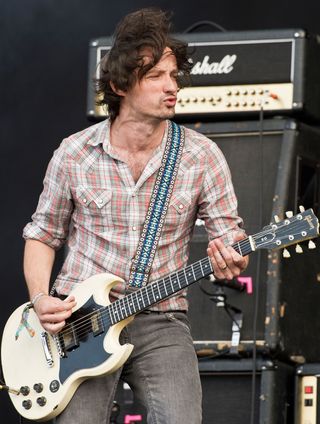
The solo on the The Wolf Bites Back doesn't sound like your SG. Was that one of Phil Campbell’s?
“Yes, it was. The Wolf Bites Back and Zeitgeist, which is the last song on the album, he does a solo on both of those, so you’ll have to ask him about that, but what a solo it is. It’s absolutely phenomenal.”
It’s surprising for him to play on those when Suicide Division is one of your more Motörhead-inspired tracks.
“I don’t know whether I dreamt this but I think he wanted to get away from the Motörhead-sounding stuff, because, I don’t know if you’ve heard his band, Phil Campbell and the Bastard Sons, but it’s very bluesy, and I can imagine he’s very into that bluesy sound, that classic-rock sound as well. So maybe he wanted to veer away a little bit from the typical Motörhead stuff that people might expect him to play on. That's why we suggested those two songs and he seemed more than happy to solo on those.”
Phil Campbell is someone who’d come from a very similar place to you musically. You started off as a blues player and it always goes back to the blues in your playing.
I was definitely that weird kid at school who was listening to the Allman Brothers and Pink Floyd when all my mates were playing football. I wanted to learn, I wanted to play Roundabout by Yes, or an Albert King song
“Yeah, I was about 11 when I started learning the basics, I kind of gave up for a couple of years but then from 13 I got really into it and I was definitely that weird kid at school who was listening to the Allman Brothers and Pink Floyd when all my mates were playing football. I wanted to learn, I wanted to play Roundabout by Yes, or an Albert King song.
“I was definitely the weird kid, and when I got into it I just really, for the next couple of years, all about the guitar, no girls, just guitar, guitar, guitar. And you’re right: it was the blues predominantly, and then a little bit of prog and ‘70s rock thrown in . . . And I’ve never changed! Nothing’s changed over the years!"
Your dad was a player. How big an influence was he?
“Yeah, you’ve done your research! My dad played classical guitar when I was a kid. He’s a great guy, my dad; he just gets into these hobbies and one minute it might be doing up cars or doing up bikes, and he gets to the best he’s gonna get at it and then he changes to something else, and at the time when I started playing guitar he was very much into classical guitar. So he was the one who really taught me how to play.
“Then, as I was getting into blues, he started getting into blues as well, and he used to take me down to a little club called The Fisheries, which was a pub in Harefield [now the Coy Carp], and they had a little barn on the side of the pub. We’d go in the barn, again when I was 13 and just getting into it, and it was great. There’d be blues bands playing all the time in there. Then he started helping me out by learning to play the bass – he was a massive part of my learning, discovering new music, so I have got a lot to owe to my dad.”
Was discovering Black Sabbath the big epiphany for you?
“It’s funny – it would have been a bit later on. I was always into Led Zeppelin, Free and Cream – those typically ‘60s early rock bands, not quite as heavy. It wasn’t until I met Ben and everyone, just before we started the band. They were all very much into death metal and real heavy, heavy music – which I wasn’t to be honest – but we all found mutual ground when we heard Sabbath. ‘Oh, this is what we’ve got to do. We’ve got to rip this band off now!’
The time when I was listening to Steve Vai and all those other guys and try to do their solos, I’d watch Eric Clapton do this solo on Further On Up The Road. It’s just that one note he keeps playing over and over, and it’s great, just ‘cos the feel is there
“So it would have probably been 16, 17, which seems ridiculously old to be getting into Black Sabbath but, again, like learning guitar, once I heard them we were all just completely hooked and had all those years’ worth of albums to research and enjoy... [They are] a massive, massive part of the band, Sabbath.”
Do you work out your solos before hand or go off the cuff and see where it lands? Something like the solo to Sons Of Salem has a sort of Yardbirds, Train Kept A Rollin’ vibe to it.
“It’s a little bit of both. That solo is almost like a little riff in itself, just something I solo’d over. Nearly all the solos are off the cuff. I can’t really write solos; they either come naturally or they don’t.
“On that particular one you’re talking about, underneath the solo, there’s a little extra riff that me and Martyn do which is separate to the rest of the song. It’s like a soloing riff. And yeah, obviously, we wrote that, but the actual solo is just off the cuff. I’ll look around to everyone and ask, ‘Is that any good?’ And they’re like, ‘Yeah... it’s all right.” Haha!”
You’ve been in this game a long time. What’s the best bit of advice you’ve had, or that you’d give?
“Just enjoy it. If you’re soloing, keeping it simple is my biggest thing. I mentioned once about The Last Waltz by The Band, the solo there from Clapton, ever since I was a kid I always loved that solo he did. And at the time when I was listening to Steve Vai and all those other guys – who I love – and try to do their solos, I’d watch Eric Clapton do this solo on Further On Up The Road. It’s just that one note he keeps playing over and over, and it’s great, just ‘cos the feel is there even though he’s not playing anything technical or flash. Just enjoy yourself, don’t stress.”
The Wolf Bites Back is out on 15 June via Universal/Candlelight Records, and available to preorder now.
Jonathan Horsley has been writing about guitars and guitar culture since 2005, playing them since 1990, and regularly contributes to MusicRadar, Total Guitar and Guitar World. He uses Jazz III nylon picks, 10s during the week, 9s at the weekend, and shamefully still struggles with rhythm figure one of Van Halen’s Panama.
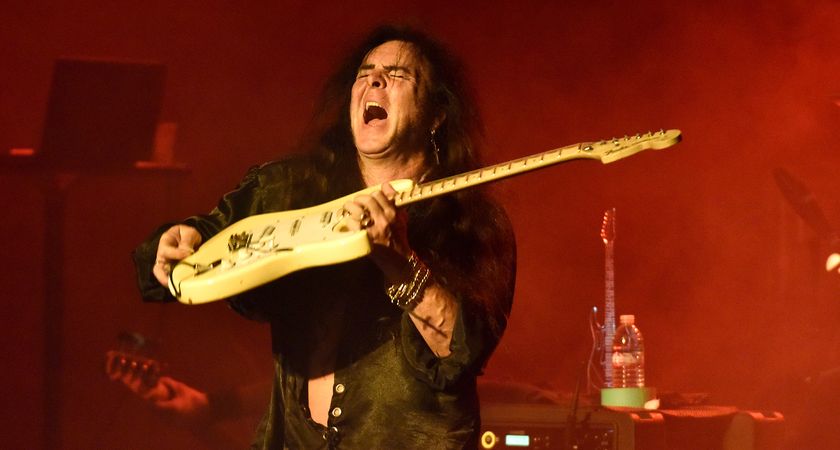
“Those arpeggios... That was the sickest thing I ever heard”: Yngwie Malmsteen on why guitarists should take inspiration from players of other instruments if they want to develop their own style
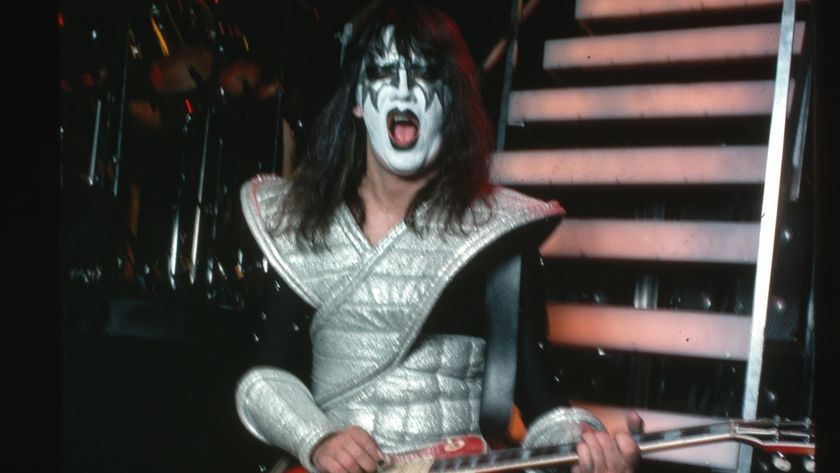
“I used a flange on the main riff and a wah-wah on the solo. I just said, ‘Hit the record button and I’ll let it rip!’”: Kiss legend Ace Frehley on his greatest cult classic song

